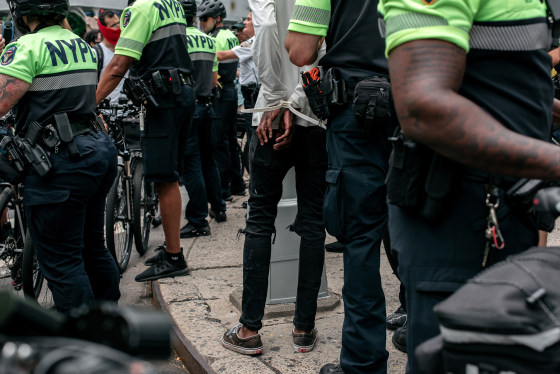As protests have erupted across the country in response to police violence and the death of George Floyd, bail funds — independent charitable organizations that collect money to provide free bail assistance to those who have been jailed before trials — have received an outpouring of donations.
On social media, posts proliferate with numbers to call and websites to visit to contribute to these bail funds. As Americans across the country watch protesters' being roughed up and arrested by police, bail has become a rallying cry. So much money has been raised over the course of just a few weeks, in fact, that the Minnesota Freedom Fund paused its donation page and linked to other organizations that directly support communities.
As Americans across the country watch protesters' being roughed up and arrested by police, bail has become a rallying cry.
The overwhelming support is inspiring, and for many protesters bail can mean the difference between spending a few hours or a night in jail. But for Black people who get arrested outside the spotlight of a national uprising, especially those who may already be struggling to make ends meet, unaffordable bail isn't just unpleasant or inconvenient. It ruins lives.
In 2016, Tracey Bell-Borden's daughter Tai was arrested when a friend's friend was caught shoplifting, and she faced a bail amount of $100,000. Tracey's mother and aunt had to empty their savings to scrape together a down payment for the $10,000 needed to get her daughter out. On top of legal fees, the family had to pay off the remaining amount owed to the bondsman each month to keep her daughter out of jail. Bell-Borden had her water shut off and her car repossessed, and she struggled to buy groceries and couldn't afford to go to the doctor. Late fees for parking tickets piled up, and debts continued to grow.
But Tracey ended up being one of the lucky ones, thanks to National Mama's Day Bail Out. With help from her community, she was able to raise more than $7,000 online. Tai still spent three days in jail, and it took a monumental effort by friends, family members and supporters over the course of a year to raise enough money just to avoid financial ruin.
Over 500,000 people in the U.S. are locked up in jail — not because they have been found guilty of crimes but because they don't have enough money to pay to get out. People who can't afford bail risk remaining behind bars for weeks and even years, which can have devastating effects on life and health.
According to the Ella Baker Center's 2015 report "Who Pays? The True Cost of Incarceration on Families," poverty and incarceration are two parts of a vicious cycle. "Estimates report that nearly 40% of all crimes are directly attributable to poverty and the vast majority (80%) of incarcerated individuals are low-income," write the authors. "In fact about two-thirds of those in jail report incomes below the poverty line."
But the consequences of the bail trap are myriad. A study by the University of Pennsylvania Law School shows that pretrial detention leads to higher court fines and fees and even a higher chance of being convicted.
As a Black woman, I know the severe, negative impacts of bail firsthand. Early last year, heavily armed police raided my mother's home in Richmond, California, to serve a warrant on my 21-year-old brother, Marjani. In the middle of the night, police broke down my mother's door and held my family at gunpoint as they arrested him. Police accused him of being a gang member and charged him with nine felonies. When the courts set his bail at $1 million, we were heartbroken, knowing there was no way we could raise that much to get him out before his trial.
For five months Marjani was locked in Martinez jail, a county away. I didn't have a car, and my mother was working full time, so it was hard for us to visit him. Phone calls were also expensive — at $1 a minute, costs quickly add up. There were suicides inside the jail. Fights broke out on a regular basis. I spent money I didn't have to send him care packages of food to try to keep his spirits and health up.
Bail is just one of the ways our nation's criminal justice system targets Black, brown and low-income people. But it is a truly pernicious one.
Marjani had been arrested before but was trying to move on with his life. He had a job as a maintenance worker at Oakland Parks, a good position that was hard for him to get because of his record. Despite all his hard work, he lost that job after he was incarcerated.
After months of the physical and mental abuse that is, inherently, a consequence of jail and after months of anxiety suffered by me and my family, all charges against my brother were dropped. He lost five months of his life that he'll never get back. He lost his job. And we all live in fear that police will snatch him and lock him up again without cause.
Bail is just one of the ways our nation's criminal justice system targets Black, brown and low-income people. But it is a truly pernicious one. That's why advocates across the country are working to shift resources from police, prisons and punishment and toward opportunities that build real safety: education, jobs and health care. And advocates and lawmakers are also experimenting with various legislative remedies, with mixed results.
As record numbers of people across the country experience detainment and arrest while exercising their First Amendment rights, it's important to keep in mind the hundreds of thousands of Americans who are wasting away in jail — even if they haven't been convicted of crimes — just because they are poor.

